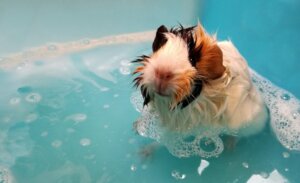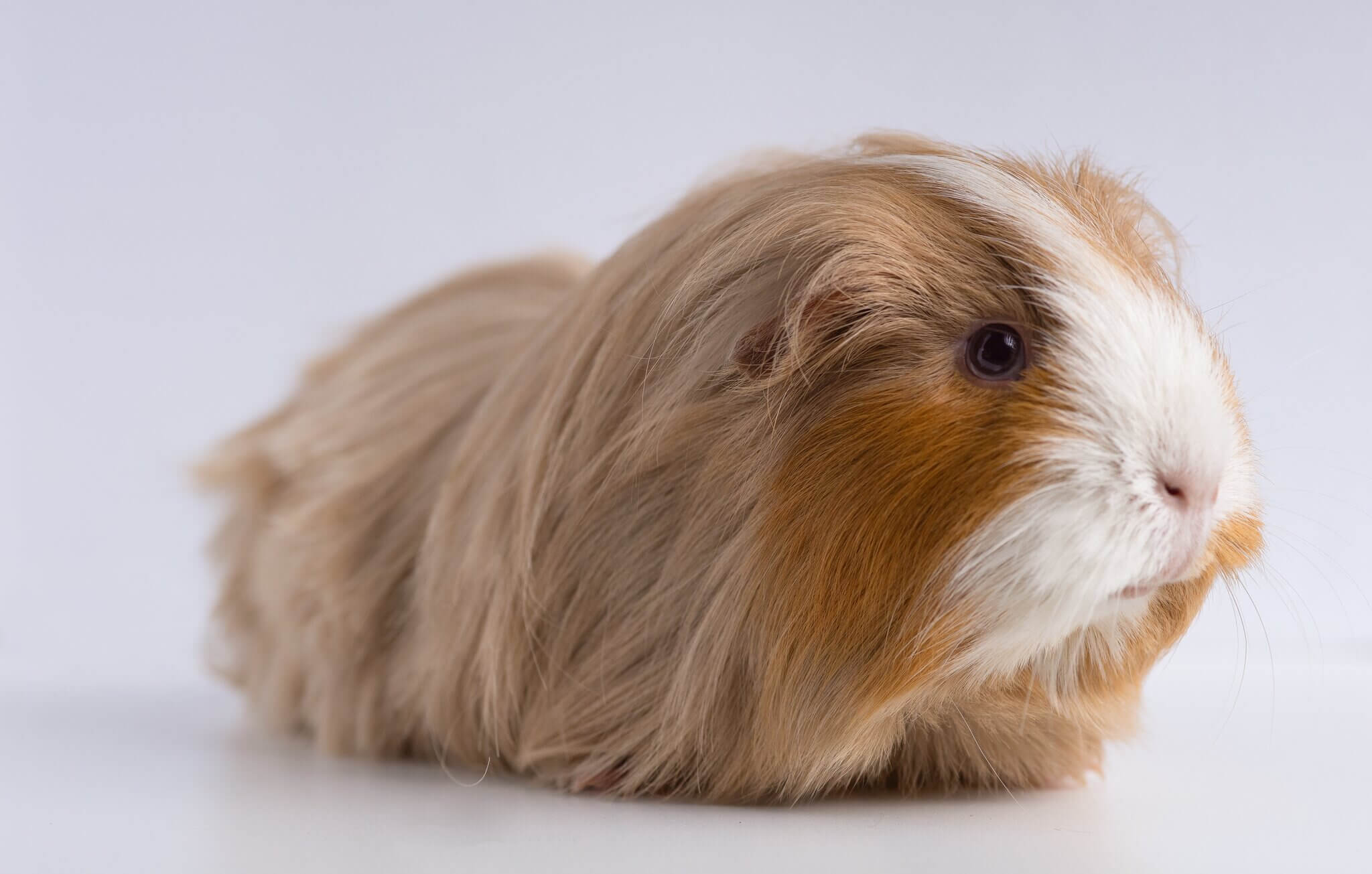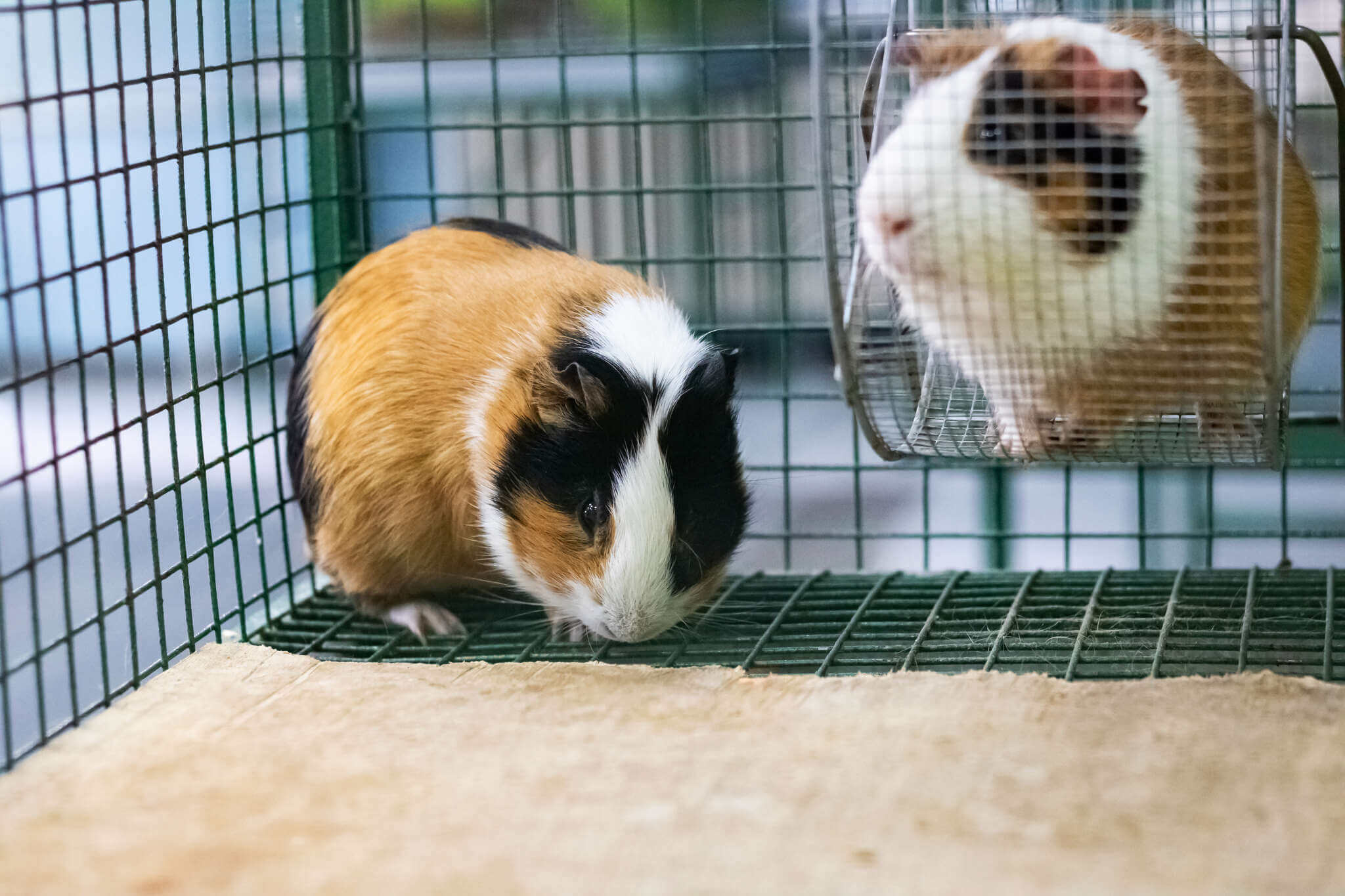How to Bathe a Guinea Pig at Home: Frequently Asked Questions


Written and verified by the biologist Georgelin Espinoza Medina
When we have a guinea pig as a pet, we want to provide it with the best possible care. This includes not only the correct food, but also an appropriate environment and all the necessary attention to keep it in good health. For this reason, one of the most frequent concerns has to do with hygiene, and we’ll be answering your questions about how to bathe a guinea pig at home.
This question is often accompanied by others, such as how to do it the right way, how often, or what products to use. If you have a guinea pig at home and want to answer these questions, then read on!
Frequently asked questions about how to bathe a guinea pig at home
Here are 5 questions related to the grooming of these cute pets. Each one has its respective answer to clarify all the doubts about it. Let’s start!
1. Do you need to bathe a guinea pig?
Generally, guinea pigs don’t have too many problems with grooming and lick their fur to groom themselves whenever necessary. This behavior can be performed individually or socially.
On a social level, submissiveness and dominance have been observed during grooming. This indicates that, in relation to scent signals, this act may play a role in the social hierarchy of domesticated guinea pigs.
Similarly, grooming behavior serves several functions in these animals. Among them, we can highlight the following:
- Removal of dirt and parasites, to maintain health
- The attraction of mates
- Thermoregulation
- Maintenance of moisture balance
- Communication
- Protection against predators
- Elimination of body odors
A study conducted at the University of Sri Lanka reveals that guinea pigs increase grooming time in dirtier and dustier environments compared to clean spaces. Despite this, the guinea pig may still need a bath at home in certain circumstances. In particular, if it belongs to a long-haired breed and has a dirtier and more disheveled coat.
2. Which shampoo should be used?
The guinea pig has a delicate skin. For this reason, you must be careful with the products you use when you bathe a guinea pig. In addition, this type of animal is quite sensitive to chemical lesions due to certain compounds.
Consequently, you can’t use just any type of shampoo or soap to bathe a guinea pig. Preferably, it’s recommended to opt for a specific product for rodents.
The organization Animal Humane Society specifies that it’s also a good option to use a shampoo for small animals, which is safe for cats and rabbits, but never choose one for humans.
3. How to bathe a guinea pig correctly?

Now that we know that it’s possible to bathe a guinea pig and we have the right shampoo, we then have to learn how to do it the right way. The best thing to do is to hold it gently in one hand throughout the whole process. This will prevent it from escaping or slipping.
In addition, care must be taken to ensure that water doesn’t get into its eyes, nose, or ears. In view of this, the rodent can’t be completely submerged. For a safe and smooth bath, it’s advisable to follow these steps:
- Find a shallow container and place warm water in it. In addition, you can use a small towel on the bottom to prevent the animal from slipping.
- Introduce the guinea pig little by little into the container.
- Dispense a small amount of shampoo and apply it to the coat.
- Rinse it out very well.
To clean the face, you can use a damp cloth and, of course, be very careful, because it’s a delicate area.
4. How to dry the guinea pig after the bath?
Drying the guinea pig after the bath is a very important step to ensure that the pet doesn’t get a chill, which will put its well-being at risk. At first, you should use a towel and dry the animal as much as possible (very carefully, of course).
Afterwards, to make sure that the fur doesn’t remain wet, you can use a hair dryer at a low temperature or minimum power. Also, be careful not to get too close to the guinea pig’s skin. One way to check that the dryer maintains the proper temperature – and power – is to check it regularly on your skin.
5. How often should you bathe a guinea pig?
Although guinea pigs can be bathed, it should be clarified that this shouldn’t be a regular procedure. In reality, these pets are very good at grooming themselves. A bath should only be prepared if it’s really necessary – when their fur is very dirty – and it shouldn’t be more than 3 times a year.
Other guinea pig care

Apart from bathing, there are other aspects that should be taken care of for the guinea pig’s well-being. One of them is brushing their fur. This is especially the case in long-haired breeds, which need more frequent care (daily), compared to short-haired breeds, which can be weekly. Among these care tips, the following stand out:
- Use a soft bristle brush so as not to harm the skin
- Trim the hair a little when it’s very long, to avoid accumulation of dirt
- Cut the nails frequently
- Keep the cage clean
Grooming and welfare
You can bathe a guinea pig at home and, although it’s a process that we shouldn’t do too often, knowing the correct way to do it is relevant for its welfare. In case of any questions, you should go and see your vet, who is the right person to advise you on everything related to this little friend.
When we have a guinea pig as a pet, we want to provide it with the best possible care. This includes not only the correct food, but also an appropriate environment and all the necessary attention to keep it in good health. For this reason, one of the most frequent concerns has to do with hygiene, and we’ll be answering your questions about how to bathe a guinea pig at home.
This question is often accompanied by others, such as how to do it the right way, how often, or what products to use. If you have a guinea pig at home and want to answer these questions, then read on!
Frequently asked questions about how to bathe a guinea pig at home
Here are 5 questions related to the grooming of these cute pets. Each one has its respective answer to clarify all the doubts about it. Let’s start!
1. Do you need to bathe a guinea pig?
Generally, guinea pigs don’t have too many problems with grooming and lick their fur to groom themselves whenever necessary. This behavior can be performed individually or socially.
On a social level, submissiveness and dominance have been observed during grooming. This indicates that, in relation to scent signals, this act may play a role in the social hierarchy of domesticated guinea pigs.
Similarly, grooming behavior serves several functions in these animals. Among them, we can highlight the following:
- Removal of dirt and parasites, to maintain health
- The attraction of mates
- Thermoregulation
- Maintenance of moisture balance
- Communication
- Protection against predators
- Elimination of body odors
A study conducted at the University of Sri Lanka reveals that guinea pigs increase grooming time in dirtier and dustier environments compared to clean spaces. Despite this, the guinea pig may still need a bath at home in certain circumstances. In particular, if it belongs to a long-haired breed and has a dirtier and more disheveled coat.
2. Which shampoo should be used?
The guinea pig has a delicate skin. For this reason, you must be careful with the products you use when you bathe a guinea pig. In addition, this type of animal is quite sensitive to chemical lesions due to certain compounds.
Consequently, you can’t use just any type of shampoo or soap to bathe a guinea pig. Preferably, it’s recommended to opt for a specific product for rodents.
The organization Animal Humane Society specifies that it’s also a good option to use a shampoo for small animals, which is safe for cats and rabbits, but never choose one for humans.
3. How to bathe a guinea pig correctly?

Now that we know that it’s possible to bathe a guinea pig and we have the right shampoo, we then have to learn how to do it the right way. The best thing to do is to hold it gently in one hand throughout the whole process. This will prevent it from escaping or slipping.
In addition, care must be taken to ensure that water doesn’t get into its eyes, nose, or ears. In view of this, the rodent can’t be completely submerged. For a safe and smooth bath, it’s advisable to follow these steps:
- Find a shallow container and place warm water in it. In addition, you can use a small towel on the bottom to prevent the animal from slipping.
- Introduce the guinea pig little by little into the container.
- Dispense a small amount of shampoo and apply it to the coat.
- Rinse it out very well.
To clean the face, you can use a damp cloth and, of course, be very careful, because it’s a delicate area.
4. How to dry the guinea pig after the bath?
Drying the guinea pig after the bath is a very important step to ensure that the pet doesn’t get a chill, which will put its well-being at risk. At first, you should use a towel and dry the animal as much as possible (very carefully, of course).
Afterwards, to make sure that the fur doesn’t remain wet, you can use a hair dryer at a low temperature or minimum power. Also, be careful not to get too close to the guinea pig’s skin. One way to check that the dryer maintains the proper temperature – and power – is to check it regularly on your skin.
5. How often should you bathe a guinea pig?
Although guinea pigs can be bathed, it should be clarified that this shouldn’t be a regular procedure. In reality, these pets are very good at grooming themselves. A bath should only be prepared if it’s really necessary – when their fur is very dirty – and it shouldn’t be more than 3 times a year.
Other guinea pig care

Apart from bathing, there are other aspects that should be taken care of for the guinea pig’s well-being. One of them is brushing their fur. This is especially the case in long-haired breeds, which need more frequent care (daily), compared to short-haired breeds, which can be weekly. Among these care tips, the following stand out:
- Use a soft bristle brush so as not to harm the skin
- Trim the hair a little when it’s very long, to avoid accumulation of dirt
- Cut the nails frequently
- Keep the cage clean
Grooming and welfare
You can bathe a guinea pig at home and, although it’s a process that we shouldn’t do too often, knowing the correct way to do it is relevant for its welfare. In case of any questions, you should go and see your vet, who is the right person to advise you on everything related to this little friend.
All cited sources were thoroughly reviewed by our team to ensure their quality, reliability, currency, and validity. The bibliography of this article was considered reliable and of academic or scientific accuracy.
- Animal Humane Society. (2023). Guinea pig bonding basics. Consultado el 27 de mayo de 2023. https://www.animalhumanesociety.org/resource/guinea-pig-bonding-basics
- Durán Astudillo, K. J. (2020). Elaboración de un etograma de cobayos machos en etapa de engorde (Cavia porcellus) en un sistema de producción en jaula, mediante el uso de un registro focal continuo. [Trabajo de Grado: Universidad Politécnica Salesiana]. Repositorio Institucional de la Universidad Politécnica Salesiana. https://dspace.ups.edu.ec/handle/123456789/18436
- Quesenberry, K., Mans, C., & Orcutt, C. (2020). Ferrets, rabbits and rodents – E-book: Clinical medicine and surgery (J. W. Carpenter, Ed.; 4th ed.). Saunders. https://books.google.at/books?id=t-_eDwAAQBAJ
- Regine Humane Society. (2023). Guinea pig care. Consultado el 27 de mayo de 2023. https://reginahumanesociety.ca/programs-services/pet-care/small-animal-care/guinea-pig-care/
- Sri, N., & Riyas, A. (2018). Preliminary studies of grooming behavior of domestic american guinea pig (Cavia porcellus). Universidad de Sri Lanka. https://www.researchgate.net/publication/329905497_PRELIMINARY_STUDIES_OF_GROOMING_BEHAVIOR_OF_DOMESTIC_AMERICAN_GUINEA_PIG_Cavia_porcellus
- Sueki, H., & Kligman, A. (2003). Cutaneous toxicity of chemical irritans on hairless guinea pigs. The Journal of Dermatology, 30(12), 859-870. https://pubmed.ncbi.nlm.nih.gov/14739512/
- The British Columbia Society for the Prevention of Cruelty to Animal. (2023). Guinea pigs. Consultado el 27 de mayo de 2023. https://spca.bc.ca/wp-content/uploads/guinea-pig-care-guide.pdf
This text is provided for informational purposes only and does not replace consultation with a professional. If in doubt, consult your specialist.








